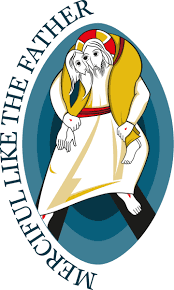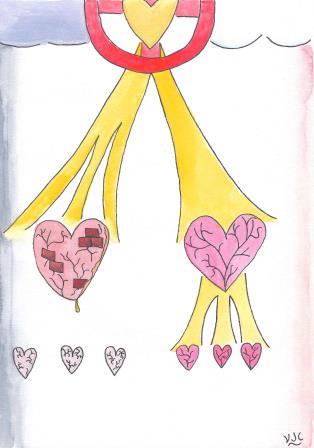In the Catholic Church the Sacrament of Penance may be celebrated in three different ways, called rites.
The first rite is individual confession to a priest.
The second rite is where a group of people gather together and listen to the Word of God, go through a guided examination of conscience together, then go and confess to one of several priests gathered for the rite, and finish with a hymn of thanksgiving and a priestly blessing; it is also known as the communal rite since it is done as a community of faith.
The third rite is an rite for emergency situations only, and carries the understanding that those who received the sacrament under this rite will present themselves to one of the other rites as soon as practicable after the emergency is over.
The third rite is a provision for situations like going into the frontline of battle at short notice. In such situations it isn’t possible to give the first rite to all those who desire it, due to time constraints, and yet they are facing the danger of death. It was used to good effect by priests who made themselves available for the first responders (firefighters etc.) who were on their way to help those trapped in the Twin Towers in New York in 2001. There is also some rationale for using the third rite in nursing home situations where residents are gathered for Mass and many of them no longer have full cognitive abilities. All of them are facing death in the not so distant future.
But during the 1980s and 1990s somehow the third rite became mainstream in parishes prior to Christmas and prior to Easter. There was normally a single celebration of the third rite in the week or so prior to Christmas and in the week or so prior to Easter. It seemed like the answer to the dwindling numbers of priests (many left the priesthood in the 1970s) and the dwindling numbers of people coming to the first rite of reconciliation. The clergy loved it because they didn’t have to spend so many hours in the confessional. The laity loved it because they didn’t have to say their sins out loud. Consequently, whenever there was a celebration of the third rite in a parish, it was standing room only.
At first the people were reminded that this was a conditional rite, and the condition was that they sought out an opportunity for first rite or second rite as soon as possible. As you may imagine this condition was observed poorly, and towards the end of this era the condition wasn’t mentioned at all.
Filling a church swells the hearts of both priests and laity, and those standing room only experiences are remembered fondly.
However, I’ve never read a single conversion story that includes a third rite of reconciliation as its turning point. I’ve never heard an anecdotal one either. If the third rite of reconciliation was leading people to conversion to Jesus and commitment to Him, then there should be conversion stories a plenty. Use of the third rite pandered to a consumerist approach to faith. All you had to do was show up, sacrifice around an hour of time, and hey presto, you had a clean slate with God. Like a car going through a car wash, and emerging cleaner but unchanged. It didn’t call anyone to missionary discipleship. It felt good, too, the atmosphere at the start was solemn and expectant, and the atmosphere at the end was joyful and light-hearted.
Use of the third rite didn’t lead to an increased use of the first rite, in fact it led to significant decrease in use of the first rite, and significant decrease in the regular parish times for the sacrament of penance.
Worse still, those who had participated in the third rite of reconciliation didn’t know for sure which sins had been forgiven and which sins hadn’t been. No one talks about it, but they all experienced this hopeful unknowing. We all hoped we had completely clean slates with God, but we didn’t know for sure.
With the first rite and the second rite, you do know for sure. That’s because you have described those sins out loud and have heard absolution of those exact sins out loud.
This hopeful unknowing was detrimental because it was unwittingly reducing the sacrament to a sacramental. A sacrament does what it says, independent of the faith of the recipient. (eg. Baptism changes a person into a child of God. Ordination changes a man into a priest.) The effect of a sacramental depends on the faith of the participant. In practice when the third rite of reconciliation was celebrated those with more faith and more contrition had less hopeful unknowing and more confidence in God’s pardon; and those with less faith and less contrition had more hopeful unknowing and less confidence in God’s pardon.
Grace may be free, but it is far from cheap. It was purchased by the sorrows, humiliations, wounds, blood and death of Jesus Christ, the Son of God, on the Cross. Accepting the forgiveness and pardon of God, purchased at such a price, is supposed to fill us with such gratitude that we freely decide to devote our whole lives to His service. It is supposed to fill us with a desire for holiness and an ongoing commitment to seeking greater holiness and freedom from sin – with the help of His grace.
While I fully understand the nostalgia of many for those experiences of full churches and joyful and light-hearted atmospheres, it is like the nostalgia that a reformed addict has for his/her addiction of choice. It’s far from helpful, and reminiscing on it does us no good whatsoever.
Thankfully Rome saw the bad fruit coming from the misuse of the third rite of reconciliation and returned it to its original purpose - for large groups in significant danger of imminent death.
Jesus is the good shepherd, and we are His sheep. When a shepherd tends the wounds of his sheep, he does so sheep by sheep, individually. Likewise, Jesus the good shepherd and doctor of our souls treats us individually, one by one, in the sacrament of penance (first rite and second rite). He listens to us (we confess our sins), He diagnoses the source of the soul sickness, He often gives us words of advice and encouragement to continue the battle with sin, He grants us absolution, and He gives us a something to do as a token of our desire to be fully converted to Him (act/s of penance). Jesus is able to do this through the priest, because the priest in the rite of ordination has completely surrendered his life to Jesus, and therefore what the priest does in the sacraments is done ‘in persona Christi’. Yes it is a mystery, but Yes it is also the reality we experience.
Are there lots of conversion stories that feature the first rite of reconciliation? Yes there are, and they are rather plentiful in stories that feature the Rite of Christian Initiation for Adults (R.C.I.A.) in their conversion stories. Preparing for the first rite of reconciliation prior to the Easter Vigil is often a major undertaking, well beyond a person’s previous experience, dreaded in advance, because it does require confronting the reality of personal sin, but greatly rejoiced over afterwards.
Nothing, but nothing beats individually hearing these priestly words after confessing our sins,
‘God, the Father of mercies, through the death and the resurrection of His Son, Our Lord Jesus Christ, has reconciled the world to Himself, and sent the Holy Spirit among us for the forgiveness of sins; through the ministry of the Church, may God give you pardon and peace, and I absolve you from your sins in the name of the Father, and of the Son and of the Holy Spirit.’
If we remember Rev 3:16 ‘Since you are only lukewarm, I will spit you out of My mouth’, then it will be easy to reject any practice that smacks of ‘What is the least I’ve got to do to scrape into heaven?’. God wants sons and daughters in deep relationship with Him, and rightly has some antipathy towards those who want His priceless gifts with as little effort as possible and with as little relationship with Him as possible. When a parent only sees a child when they want a cash advance, and not at any other time, the parent still deeply loves that child, but is so disappointed about the might-have-been’s, the shared experiences that didn’t happen, the heart to hearts that never had a chance to begin.
The sacrament of penance makes sense when it is a regular part of a deep and ongoing loving relationship with God. It also makes sense when a prodigal returns and wants to re-start such a relationship with God.
Granted, many of those who came to the third rite of reconciliation no longer knew that more was possible. Many may not have been in a confessional since they were at school. Fear of facing and admitting our sins is a deterrent we all experience. That fear doesn’t go away, but it does lessen if we overcome it on a regular basis. Those who do overcome that fear and confess to a priest (first rite or second rite) experience the wonders of God’s mercy, compassion and help. It is reprehensible that we speak so little of the benefits and blessings of individual confession. It is reprehensible that we promoted the misuse of the third rite of reconciliation and did so little to promote the first and second rites.
Please may this nostalgia for the misuse of the third rite of reconciliation cease. Amen.
Please may the wonders of God’s mercy to be found in the first and second rites of reconciliation be proclaimed effectively and without ceasing. Amen.



 RSS Feed
RSS Feed